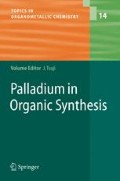Abstract
This review summarizes the Pd-catalyzed cyclization of an allene bearing a nucleophilic functionality with an organic or inorganic halide, and the cyclization involving two allene moieties or an allene–alkene, allene–1,3-diene, allene–alkyne, allene–aldehyde, or allene–ketone combination in the presence or absence of an organic halide. The cyclic compounds were formed highly selectively via (1) intermolecular carbopalladation–intramolecular allylic substitution, (2) intramolecular nucleopalladation–intermolecular carbopalladation, or (3) an intermolecular carbopalladation (hydropalladation, etc.)–intramolecular insertion mechanism. The selectivity of these reactions largely depends on the substitution pattern of the allene moiety and the nature of the palladium catalyst. In all these reactions, the regeneration of the catalytically active palladium species is the key for a catalytic reaction.

Preview
Unable to display preview. Download preview PDF.
Author information
Authors and Affiliations
Corresponding author
Editor information
Rights and permissions
About this chapter
Cite this chapter
Ma, S. Palladium-Catalyzed Two- or Three-Component Cyclization of Functionalized Allenes. In: Tsuji, J. (eds) Palladium in Organic Synthesis. Topics in Organometallic Chemistry, vol 14. Springer, Berlin, Heidelberg. https://doi.org/10.1007/b104131
Download citation
DOI: https://doi.org/10.1007/b104131
Published:
Publisher Name: Springer, Berlin, Heidelberg
Print ISBN: 978-3-540-23982-6
Online ISBN: 978-3-540-31443-1
eBook Packages: Chemistry and Materials ScienceChemistry and Material Science (R0)

